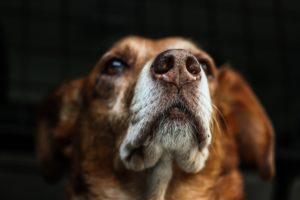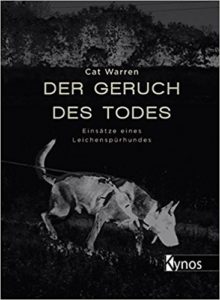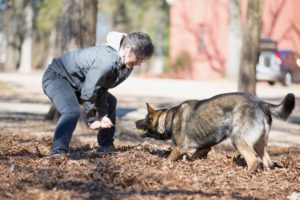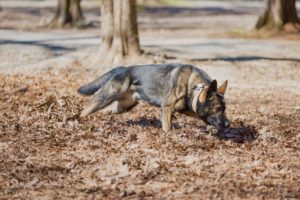
Two years ago I interviewed Cat Warren, a cadaver dog handler and author of the New York Times bestselling What the Dog Knows: Scent, Science, and the Amazing Ways Dogs Perceive the World. She gave my readers advice about whether their dogs might make good cadaver dogs.
Her bestseller has now been translated into German and will appear in October 2017. My German readers can watch out for the title Der Geruch des Todes: Einsätze eines Leichenspürhundes (Kynos Verlag; “The Scent of Death: A Cadaver Dog in Action”). To celebrate the launch of the German book, I’ve posed Cat some new questions to follow up on her fascinating career.
Welcome, Cat Warren!

There are no volunteer cadaver dog handlers in Germany. By law, a cadaver dog handler must be a police officer. For the Germans interested in reading Der Geruch des Todes, could you explain how the American volunteer system works?
It’s mostly about law enforcement budgets here in the United States. The fact is, cadaver dogs aren’t needed every day in the same way a patrol dog is needed every day. One of the founders of the field, Andy Rebmann, started the first cadaver dog program in the late 1970s with the Connecticut State Police. That program has survived up through the present. Other programs spun off from Andy’s founder effect—Rhode Island, Massachusetts, New Hampshire, Vermont, Maine. And a couple of large cities, New York and Chicago, have cadaver dogs and handlers. I’m also seeing a resurgence of law enforcement cadaver dogs across the United States. That’s hugely anecdotal, I know. But several additional law enforcement agencies here in North Carolina have gotten cadaver dogs, just in the past five years.
And a case that got national attention here in the United States in late July had law enforcement cadaver dogs on the scene. In Bucks County, Pennsylvania, two cousins murdered four young men and buried them with a back hoe on a remote country farm. The cadaver dogs were able to pinpoint where three of the victims were buried, 12 ½ feet deep (Here’s a link to what I think is the best story about it: https://www.usnews.com/news/best-states/pennsylvania/articles/2017-07-22/finding-bodies-a-well-trained-dog-cant-be-replaced).
Several larger police departments in the United States have cadaver dog and handler teams, and some small ones scattered across the country — especially sheriff departments — partly because their work can tend to be more rural and cadaver dogs can be so helpful in searches in rural areas. But many law enforcement departments depend on volunteers for this function. A good volunteer dog-and-handler team can produce some excellent results. Those relationships between law enforcement and cadaver dog teams are often informal. But if you look at a disaster such as Hurricane Harvey here in the United States, which is still unfolding, you’ll see that cadaver dogs will play an important role in helping recover victims. The majority of those dog teams will be volunteers.

Der Geruch des Todes has several audiences: law enforcement dog handlers, volunteer search and rescue dog handlers, and curious dog owners. What does your book offer to each of them?
I want my book to appeal to a diverse set of readers: that includes not only dog handlers and dog lovers, but people who love science, mystery, and history. To me, what is fascinating about working with dogs goes well beyond the idea of having your best friend at your side. Sure, that’s part of it. I love dogs. I love to be with them. I spend a fair amount of time cuddling Jaco, our current German shepherd, when I want to relax on the couch. But working with scent-detection dogs immediately moves me into the realm of thinking about crime, legal issues, the search environment, the challenges of rigorous training — and even understanding the science behind scent. So the questions that engaged me when I was researching the book took me beyond cold, wet noses and wagging tails.
What’s the typical kind of case you get called out to work on?
At the moment, I’m not deploying a dog. I have a wonderful German shepherd who is in training, and is certified to work, but I want him to have a national certification before I deploy him. It’s important that one be able to prove in court that you have a dependable, consistent, rigorously trained dog. It’s lucky that I love to train, as well as to do actual searches. I think most working dog people do, as that’s how you spend the majority of your time: training.
During the 8 years that I deployed Solo, who is the subject of Der Geruch des Todes, we worked on a mixture of cases, from people who were missing with evidence that it was homicide, to Alzheimer patients, to cases where people suspected of a crime were missing and presumed dead.

Have you ever felt frightened during a search?
Yes. It’s inevitable. That being said, it’s important to not allow that fear to travel down the leash, where the dog picks up on it. Usually, I was only frightened for myself because the suspect was not yet in custody, and we were working in areas that were remote. Another time, we were working in an area where a farmer threatened to shoot the dogs if he saw them, though we had permission to search in the area. That made the fine hairs on the back of my neck prickle. Often, though, I’ll be worried because I want to make sure my dog isn’t harmed. Sometimes, it’s as simple as searching alongside a busy road, and making sure the dog doesn’t dash into traffic. Or working in an area where there are other physical dangers. Bad stuff can happen quickly on searches. It’s the dog’s job to use his nose, and it’s my job to make sure the area is covered, and the dog is safe while he’s concentrating on following scent.


